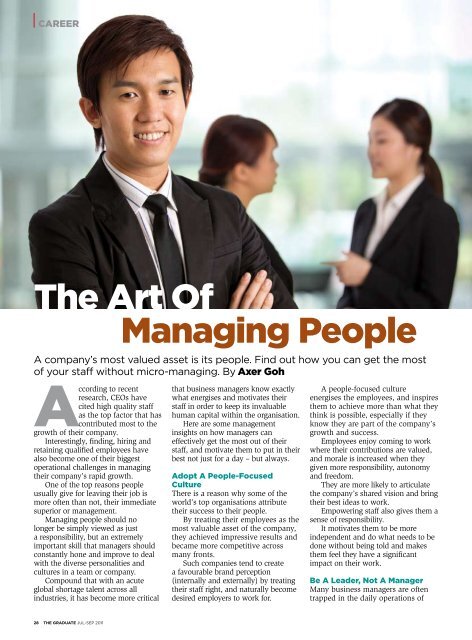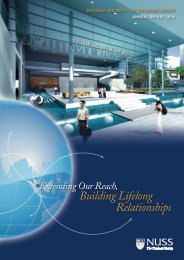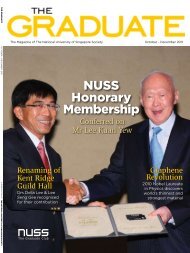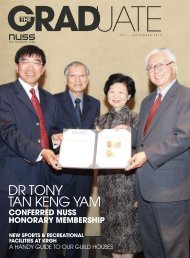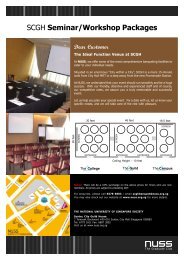NUss Distinguished & outstanding Member Awards
NUss Distinguished & outstanding Member Awards
NUss Distinguished & outstanding Member Awards
Create successful ePaper yourself
Turn your PDF publications into a flip-book with our unique Google optimized e-Paper software.
Career<br />
The art Of<br />
Managing People<br />
A company’s most valued asset is its people. Find out how you can get the most<br />
of your staff without micro-managing. By axer Goh<br />
according to recent<br />
research, CEOs have<br />
cited high quality staff<br />
as the top factor that has<br />
contributed most to the<br />
growth of their company.<br />
Interestingly, finding, hiring and<br />
retaining qualified employees have<br />
also become one of their biggest<br />
operational challenges in managing<br />
their company’s rapid growth.<br />
One of the top reasons people<br />
usually give for leaving their job is<br />
more often than not, their immediate<br />
superior or management.<br />
Managing people should no<br />
longer be simply viewed as just<br />
a responsibility, but an extremely<br />
important skill that managers should<br />
constantly hone and improve to deal<br />
with the diverse personalities and<br />
cultures in a team or company.<br />
Compound that with an acute<br />
global shortage talent across all<br />
industries, it has become more critical<br />
28 THE GRADUATE jul-sep 2011<br />
that business managers know exactly<br />
what energises and motivates their<br />
staff in order to keep its invaluable<br />
human capital within the organisation.<br />
Here are some management<br />
insights on how managers can<br />
effectively get the most out of their<br />
staff, and motivate them to put in their<br />
best not just for a day – but always.<br />
adopt a People-Focused<br />
Culture<br />
There is a reason why some of the<br />
world’s top organisations attribute<br />
their success to their people.<br />
By treating their employees as the<br />
most valuable asset of the company,<br />
they achieved impressive results and<br />
became more competitive across<br />
many fronts.<br />
Such companies tend to create<br />
a favourable brand perception<br />
(internally and externally) by treating<br />
their staff right, and naturally become<br />
desired employers to work for.<br />
A people-focused culture<br />
energises the employees, and inspires<br />
them to achieve more than what they<br />
think is possible, especially if they<br />
know they are part of the company’s<br />
growth and success.<br />
Employees enjoy coming to work<br />
where their contributions are valued,<br />
and morale is increased when they<br />
given more responsibility, autonomy<br />
and freedom.<br />
They are more likely to articulate<br />
the company’s shared vision and bring<br />
their best ideas to work.<br />
Empowering staff also gives them a<br />
sense of responsibility.<br />
It motivates them to be more<br />
independent and do what needs to be<br />
done without being told and makes<br />
them feel they have a significant<br />
impact on their work.<br />
Be a Leader, Not a Manager<br />
Many business managers are often<br />
trapped in the daily operations of


